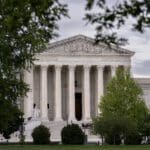Attorney General Ken Paxton’s securities fraud trial set for April 15
Sign up for The Brief, The Texas Tribune’s daily newsletter that keeps readers up to speed on the most essential Texas news. Attorney General Ken Paxton’s long-delayed trial on securities fraud charges has been set for April 15. State District Judge Andrea Beall scheduled the trial during a hearing Monday morning in Houston. Paxton attended […]

Sign up for The Brief, The Texas Tribune’s daily newsletter that keeps readers up to speed on the most essential Texas news.
Attorney General Ken Paxton’s long-delayed trial on securities fraud charges has been set for April 15.
State District Judge Andrea Beall scheduled the trial during a hearing Monday morning in Houston. Paxton attended the hearing but did not speak at it.
Paxton was indicted on the charges over eight years ago, months into his first term as the state’s top law enforcement official. The charges stem from accusations that in 2011 he tried to solicit investors in a McKinney technology company without disclosing that it was paying him to promote its stock. Paxton has pleaded not guilty.
The trial is a reminder that Paxton’s legal problems persist even after the Texas Senate acquitted him last month in an impeachment trial on unrelated allegations. Lt. Gov. Dan Patrick presided over that trial and has faced intense criticism for taking $3 million from a pro-Paxton group in the lead-up to the trial.
“Unlike the impeachment, this is going to be a fair trial,” special prosecutor Kent Schaffer told reporters after the hearing. “This judge is not corrupt. This judge is not on the take.”
The hearing was brief and did not settle one lingering pretrial issue: how much the special prosecutors should get paid. The judge also scheduled a February pretrial conference.
Paxton’s lawyer Philip Hilder told reporters his side was “gratified” with the trial date and criticized the special prosecutors for their focus on their pay.
“It’s show-me-the-money,” Hilder said. “It’s all about the money to them.”
The prosecutors say they have not been paid since January 2016. A Paxton supporter filed a lawsuit challenging their fee schedule in the early months of the case, and both sides have been wrangling over the issue ever since.
The trial has been delayed for years over a number of pretrial disputes, including the prosecutors’ pay and the venue. The case began in Paxton’s native Collin County but was moved to more neutral territory in Harris County at the prosecution’s urging.
Paxton faces two counts of securities fraud, a first-degree felony with a punishment of up to 99 years in prison. Paxton also faces one count of failing to register with state securities regulators, a third-degree felony with a maximum of 10 years in prison.
The impeachment trial centered on different allegations of bribery and malfeasance made by former top deputies in his office. When the House impeached Paxton in May, it included multiple articles of impeachment related to the securities case, but the Senate set those aside for the trial and dismissed them afterward.
While the prosecutors emphasized they expect a fairer trial than the one the Senate conducted, Hilder declined to draw any comparisons. The impeachment trial “was unrelated to what we’re defending against,” Hilder said.
The impeachment articles focused on allegations that Paxton misused his office to help his friend investigate claims that he was being targeted by federal and local law enforcement, in exchange for favors that included giving a job to a woman with whom he was having an affair.
While the Senate’s acquittal was a political triumph for the third-term Republican, Paxton still has significant legal issues. In addition to the securities fraud case, he faces a federal investigation into the claims by his former top staffers, who allege he abused his office to help a friend and donor, Nate Paul.
In the securities fraud case, the prosecutors’ pay may be the last major pending issue before the trial. In 2018, the Texas Court of Criminal Appeals struck down the fee agreement, arguing that it fell outside legal limits for what such attorneys may be paid. The court ordered a previous Harris County judge overseeing the case to come up with a new payment schedule, but that never happened and the prosecutors have continued to go unpaid.
During the hearing Monday, Paxton lawyer Bill Mateja sought to propose an order addressing the pay issue from his side’s perspective. But Beall repeatedly said she would decide on her own.
The judge did not indicate when she would make a ruling on the pay, according to one of the prosecutors, Brian Wice.
Wice said Paxton’s lawyers are so focused on their pay because they have known “the only way to derail this prosecution was to defund it.” Wice said he is owed “a lot” and Schaffer estimated he has “500 unpaid hours” dating back to 2016.
The prosecutors have previously raised the possibility they could withdraw from the case if they are not paid. Asked about that Monday, Schaffer said “we have to see what happens,” while Wice promised he is “not going anywhere.”
This article originally appeared in The Texas Tribune at https://www.texastribune.org/2023/10/30/ken-paxton-securities-fraud-charges-trial/.
The Texas Tribune is a member-supported, nonpartisan newsroom informing and engaging Texans on state politics and policy. Learn more at texastribune.org.
Recommended

Rosenblum, other Democratic AGs ask SCOTUS to block red state bans on emergency abortions
Oregon Attorney General Ellen Rosenblum and nearly two dozen other Democratic-led states urged the U.S. Supreme Court to preserve the ability of emergency room doctors to provide abortions, arguing that failing to do so would have devastating effects for their health care systems and women across the country.
By Gloria Rebecca Gomez, Arizona Mirror - April 01, 2024
Ken Paxton paid $2.3 million to defense lawyers for impeachment trial
The lawyers were paid from his campaign, according to a report filed this week.
By Patrick Svitek, The Texas Tribune - January 18, 2024
Texas governor and attorney general do little to curb state’s chemical plant crisis
Republicans Greg Abbott and Ken Paxton have taken thousands of dollars in donations from chemical companies and their affiliated PACs.
By Jesse Valentine - December 08, 2023








































































